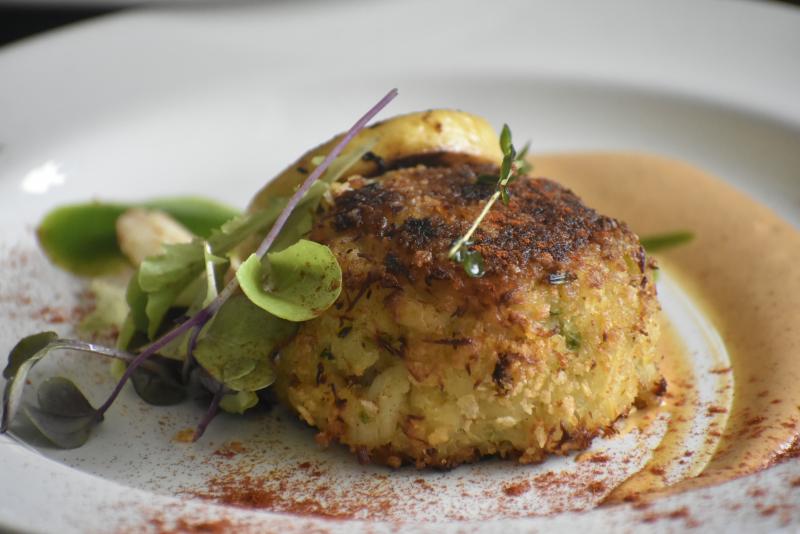Tyler checks the level of bacteria in one of the tanks.
Bruce Crosby/McCook Gazette
McCOOK, Neb. -- Tyler McCarty’s livestock operation should be the envy of feeders throughout cattle country.
His “herd” achieves a “conversion rate” -- the amount of feed consumed compared to the weight of food produced -- that is many times higher than that achieved in feedlots throughout the cornbelt.
And, rather than dealing with the packing industry, the shrimp he produces will be sold directly to the consumer — at least for the first couple of years.
Tyler McCarty holds one of the shrimp that is nearly ready to market.
Bruce Crosby/McCook Gazette
His “Saltwater Hills” enterprise, under another name, was the winner of last year’s Hormel Business Plan competition, and now, a year and a half later, is about ready go into full production.
Saltwater Hills occupies about half of a large former rabbit production facility atop “M Hill” south of McCook, and Tyler, with the help of his dad, Dave and other members of the family, have spent the months since the arrival of their first batch of baby shrimp in October 2019, cultivating the water in eight repurposed above-ground swimming pools to create just the right environment for a bountiful harvest of shrimp.
Like a batch of sourdough bread, a special bacteria works in the water, feeding on waste from the shrimp to produce a protein to result in that “super efficient” feed conversion rate.
Dave, left, and Tyler McCarty tend their shrimp crop on M Hill south of McCook.
Bruce Crosby/McCook Gazette
Tyler, who owned a marketing and video production company in Omaha before returning to help run the long-time McCarty family business, Mac’s Drive-In, takes a broad view of the “future of food.”
If the population keeps growing at its current rate, Tyler said, experts “think we’ll need 70% more food production to feed the world” by as soon as the 2030s by recent estimates, he said.
“In 20 years, there may be a calorie shortage” and traditional agriculture like that now practiced in Nebraska won’t be able to meet that demand.
Aquaculture may provide the answer, he said, but less that 5 percent of the shrimp consumed in the United States is produced here. The international “shrimp industry is disgusting,” he said, and many imported shrimp contain high levels of impurities such as hormones, antibiotics and chemicals that have to be added because the water where the shrimp are raised is so polluted.
By contrast, Saltwater Hills operates on 100% recycled water requiring no chemicals or mechanical filtration.
Called a heterotropic biofloc recirculation system, it requires only water, food leftover from the bacterial activities and oxygen.
Always interested in aquatic life, Tyler found it natural to scale up his study of saltwater reef aquariums to industrial size when he found out about inland shrimp farms.
Noting that America has an $8 billion trade deficit when it comes to shrimp, “it seemed like the industry was ripe for disruption.”
And he isn’t selfish when it comes to sharing his hard-earned knowledge of shrimp production.
“My vision is to help others” get into the business, he said. A lot of new shrimp production facilities are being built in old hog confinement facilities.
While young shrimp, along with a small supply of healthy, bacteria-laden water, have been coming from a supplier in Indiana, a 12 1/2 hour drive away, Saltwater Hills has begun using “nursery tanks” to start with baby shrimp the size of an eyelash, grow them to an gram (the weight of a dollar bill), then transfer them to other tanks where they eventually grow to 23 grams, or about 20 shrimp per pound.
Videos will be an important part of the marketing plan, with a portion of the M Hill facility set up as sort of a test kitchen, but, following this fall’s official opening of the business, Tyler plans to market the shrimp only as far as they can be delivered fresh in cold water.
Tyler plans to add four more 5,000-gallon production tanks to the current eight as well as two nursery tanks, and said three or four “harvests” per year, or 500 to 700 pounds of shrimp per year are possible from each tank.
Two blowers provide vital air to each tank, with backup generators ready to kick on if power is interrupted. The entire shrimp farm could be lost in short order if an adequate level of oxygen isn’t maintained in each tank.
Saltwater Hills has a tiny carbon footprint, Tyler said, using only a small amount of natural gas to heat the building in the winter, and enough electricity to keep the blowers working.
McCook’s Citta Deli and Coppermill restaurants have delighted customers with Saltwater Hills shrimp so far, but signs are good that locally-grown crustaceans will become as much a source of pride as a locally-raised T-bone steak.
The Link LonkAugust 29, 2020 at 12:52AM
https://ift.tt/2EBFfJd
'Saltwater Hills' shrimp farm ready to go into full production - McCook Daily Gazette
https://ift.tt/3eNRKhS
shrimp

No comments:
Post a Comment